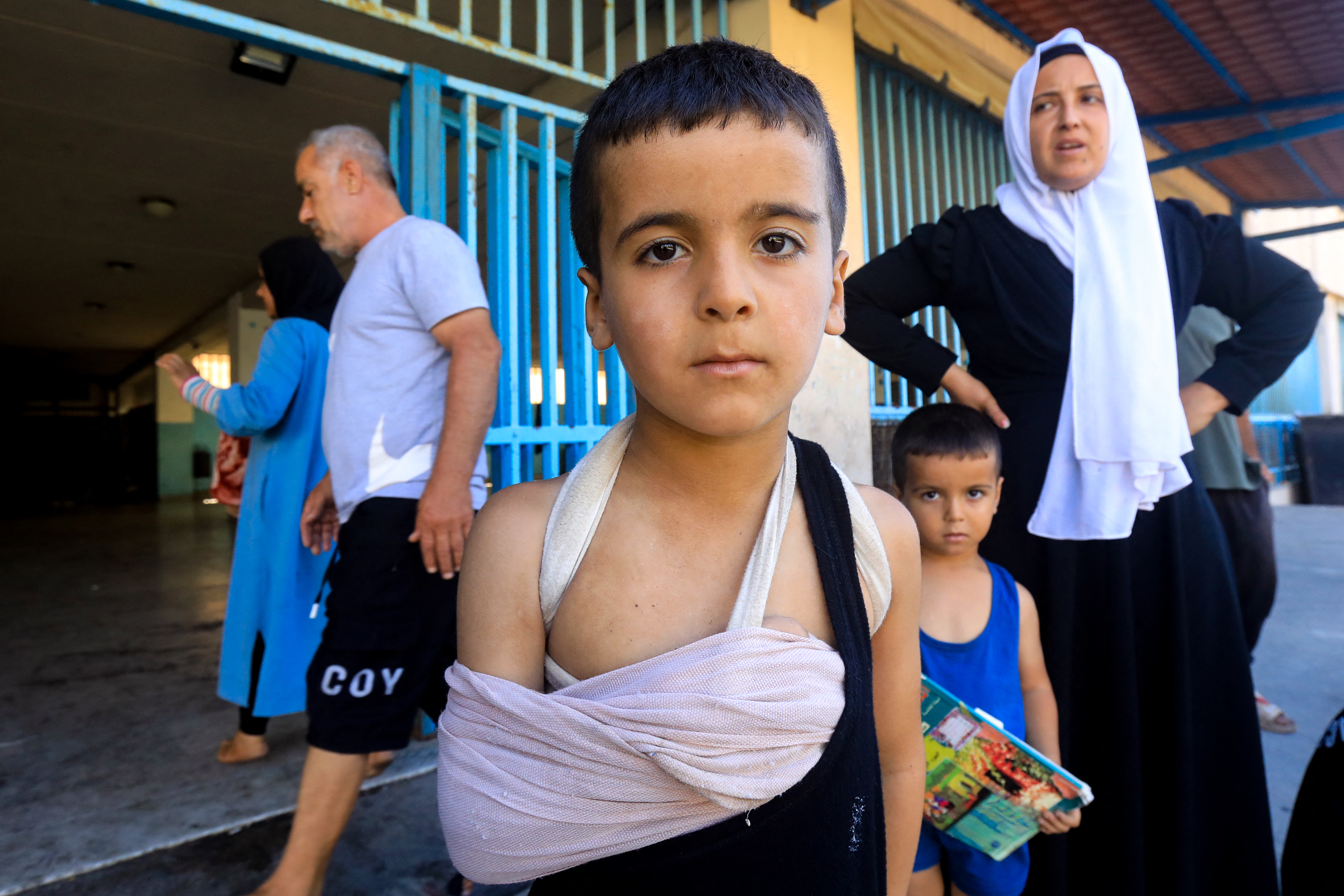Jerusalem/Beirut/New York — Israel’s defense ministry said on Thursday it had secured an $8.7 billion aid package from the United States to support the country’s ongoing military efforts, including upgrading air defense systems.
“The package includes $3.5 billion for essential wartime procurement … and $5.2 billion designated for air defense systems, including the Iron Dome, David’s Sling, and an advanced laser system,” the ministry said in a statement.
In Beirut, Lebanese authorities said Thursday that more than 1,500 people had been killed in almost a year of cross-border violence between Hezbollah and the Israeli army that has spiraled dramatically this week.
According to figures in a statement released by the country’s disaster management unit, 1,540 people have been killed, 60 of them in the past 24 hours, and 5,410 wounded in the ongoing hostilities.
In a related development, the Lebanese armed group Hezbollah said it targeted on Thursday the northern Israeli town of Safed with dozens of rockets in response to Israeli attacks on Lebanon.
“Defending Lebanon and its people, and in response to the barbaric Israeli” attacks on “cities, villages and civilians” in Lebanon, Hezbollah fighters targeted Safed “with 80 rockets”, a statement said.
According to Lebanon’s Health Ministry, 19 Syrian refugees and a Lebanese national were killed in northeast Lebanon after an Israeli airstrike destroyed a building housing workers.
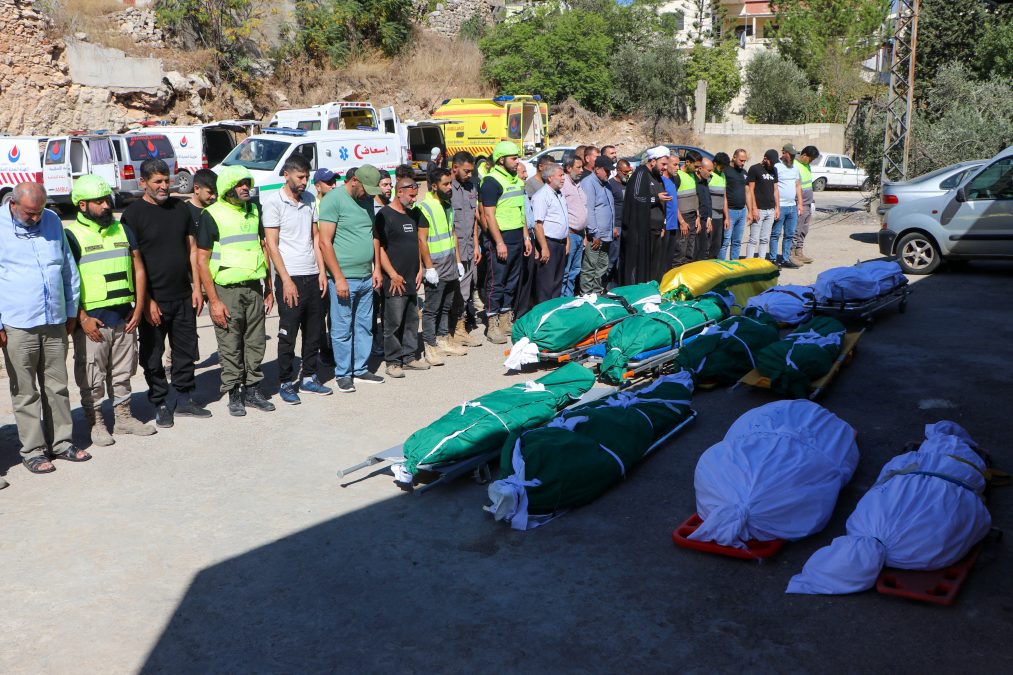
Also on Thursday, the health ministry said two people were killed and 15 were wounded after an Israeli airstrike hit an apartment building in a southern suburb of Beirut. The Israel Defense Force said the strike killed a Hezbollah drone commander, Mohammed Hussein Surour.
The strikes came after Israel’s military chief said Wednesday that the country was preparing for a possible ground operation in Lebanon as Hezbollah launched dozens of rockets into Israel. Prime Minister Benjamin Netanyahu said Thursday that Israel is striking Hezbollah “with full force” and won’t stop until its goals are achieved.
Late Wednesday, the United States, France, and other allies jointly called for an “immediate” 21-day cease-fire to allow for negotiations as fears grow that the violent escalation in recent days – following 11 months of cross-border exchange of fire – could grow into an all-out war.
The United Nations says over 90,000 people have been displaced by five days of Israeli strikes on Lebanon, bringing the total to 200,000 people who have been displaced in Lebanon since Hezbollah began firing rockets into northern Israel in support of Hamas after it stormed into Israel, sparking the Israel-Hamas war.
In London, Britain’s defense secretary has echoed the call for a pause in Israel’s conflict with Hezbollah.
“I urge President Netanyahu and the Lebanese Hezbollah leaders to pay heed to the combined voices at the United Nations to do just that,” John Healey said after a meeting with his U.S. and Australian counterparts in London.
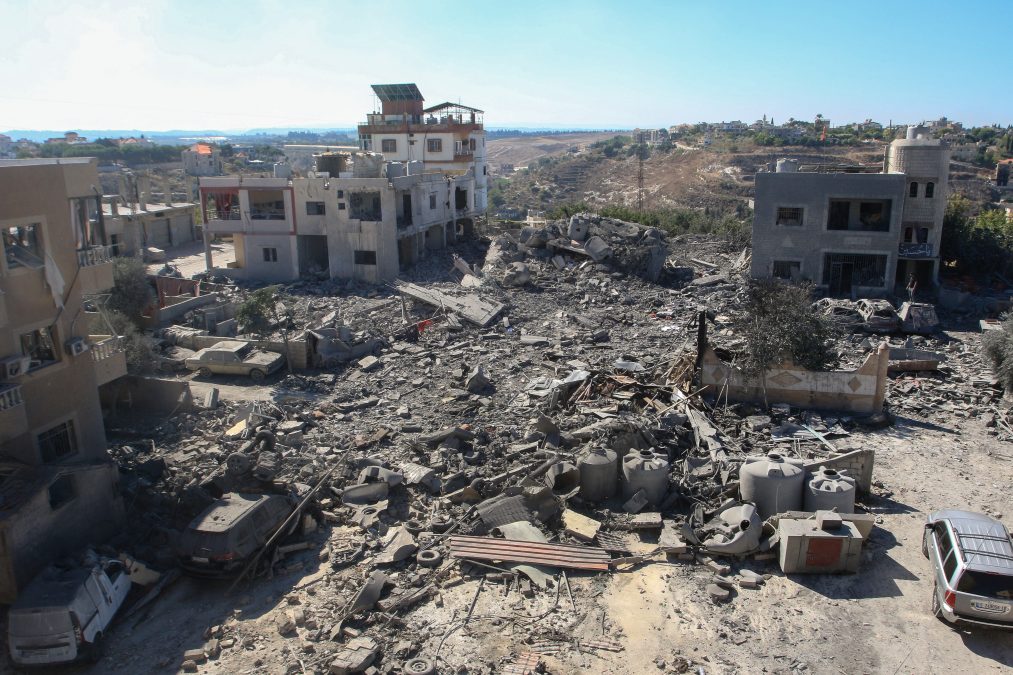
Healey said his country has sent 700 troops to Cyprus to assist in a potential emergency evacuation of civilians in Lebanon should a full war break out.
U.S. Secretary of Defense Lloyd Austin pressed both Israel and Lebanon to choose the path of ceasefire and urged each side to accept a temporary pause to avoid further escalation.
“Israel and Lebanon can choose a different path,” he said. “Despite a sharp escalation in recent days, a diplomatic solution is still viable … All parties should seize this opportunity.”
And he issued a warning to Iran and other U.S. adversaries, saying: “No one should try to exploit this crisis or expand this conflict.”
However, in New York Prime Minister Benjamin Netanyahu says Israel is striking Hezbollah “with full force” and won’t stop until its goals are achieved.
Netanyahu spoke as he landed in New York to attend the annual U.N. General Assembly meeting and as U.S. and European officials were pressing for a 21-day halt in fighting between Israel and Lebanon’s Hezbollah to give time for negotiations.
Netanyahu said Israel’s “policy is clear. We are continuing to strike Hezbollah with full force. And we will not stop until we reach all our goals, chief among them the return of the residents of the north securely to their homes.”
He added that he approved the “targeted killing operation” of the head of Hezbollah’s drone unit in south Beirut Thursday.
Also in New York, United States Secretary of State Antony Blinken says the world is united in calling for a cease-fire between Israel and Hezbollah and will be seeking approval from Israeli officials after the release of a proposal for a temporary 21-day halt in fighting.
“It is now the G7 countries, the European Union, the leading Arab countries, everyone speaking with one clear voice about the need to get that cease-fire in the north,” Blinken said in an interview with MSNBC on Thursday before he met Israeli Prime Minister Benjamin Netanyahu’s top strategy advisor, Ron Dermer, in New York.
“I can’t speak for him,” Blinken said of Netanyahu. “I can just say that the world is speaking clearly for virtually all of the key countries in Europe and in the region on the need for the ceasefire.”
“What we’re saying, what the world is saying, is very clear, and we’ll be looking to work with the Israelis and all the parties throughout the rest of the day,” he added.
In the Yemeni capital Sanaa, the leader of Yemen’s Huthis said Thursday the Iran-backed rebels “will not hesitate to support Lebanon and Hezbollah” as cross-border fire between the Lebanese group and Israel intensifies.
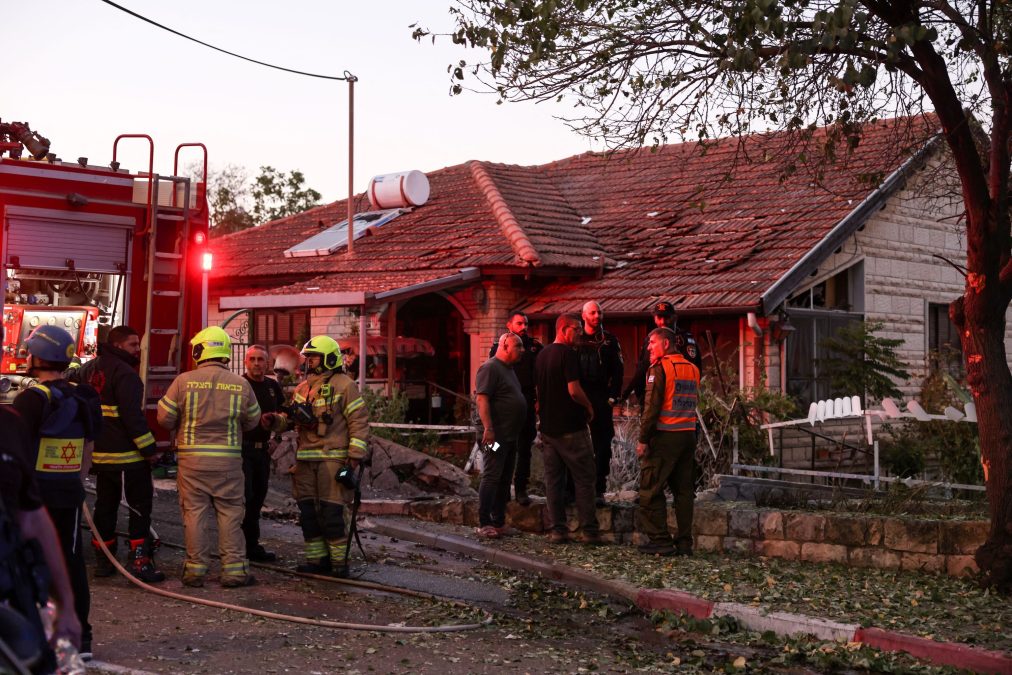
In a televised address, Abdul Malik al-Huthi condemned Israeli strikes on Lebanon, saying they aim to block Hezbollah, also backed by Iran, from “supporting Gaza and the Palestinian people”.
Since November, the Huthis have targeted Red Sea shipping with drones and missiles, saying it was in solidarity with Palestinians in the Gaza war which was sparked by Hamas’s October 7 Attack on Israel.
Israel this month said it was shifting its military’s focus from Gaza to Hamas ally Hezbollah, which has clashed with Israeli forces since the Gaza war began.
Lebanon said on Thursday that 1,540 people have been killed in Israel’s intensified strikes this week.
The Huthi chief described Israel’s action in Lebanon as “pre-planned aggression” that had been “in place for years” while asserting Hezbollah was “stronger than ever before”.
Drawing on the 2006 Israel-Hezbollah war, he warned any “ground operation in Lebanon will inflict heavy losses on the enemy and its inevitable result will be a great defeat”.
The Huthi leader added that Hezbollah’s missiles could hit all parts of “occupied Palestine”.
The Huthis are fighting Israel as part of Iran’s “Axis of Resistance”, which includes Hamas, Lebanon’s Hezbollah, and several Iraqi Shiite Muslim groups.
In Berlin, German Chancellor Olaf Scholz warned Thursday that the Israel-Hezbollah conflict could spark a “regional conflagration” after holding talks with Israeli opposition politician Benny Gantz.
Gantz, a centrist lawmaker and former military chief, was a member of Prime Minister Benjamin Netanyahu’s war cabinet until June, when he quit claiming a lack of a post-war plan for Gaza.
During a visit to Berlin, Gantz also met German President Frank-Walter Steinmeier and other officials to discuss Israel’s two-front war against Hamas in Gaza and Iran-backed Hezbollah in Lebanon.
Scholz posted on X that “Hezbollah must withdraw from the border area of Lebanon” and that “all parties have a responsibility to find a diplomatic solution”.
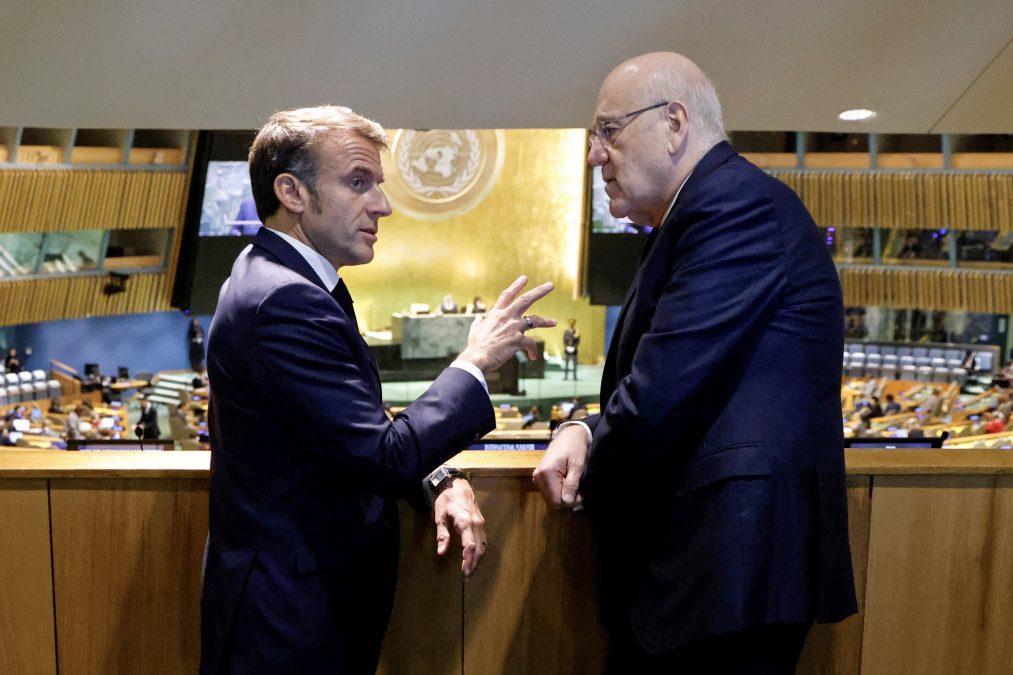
The German leader, who spoke with Lebanese Prime Minister Najib Mikati on Wednesday, said: “the conflict between Israel and Hezbollah must not become a regional conflagration”.
Scholz’s spokesman said the chancellor added that “Iran also has a responsibility to de-escalate the situation”, and that urgent steps were needed toward a Gaza ceasefire and the release of Israeli hostages.
Germany has joined a group of nations that called “for an immediate 21-day ceasefire across the Lebanon-Israel border”.
Israel rejected Thursday the ceasefire push led by key backer the United States, vowing to keep fighting Hezbollah militants “until victory”.


